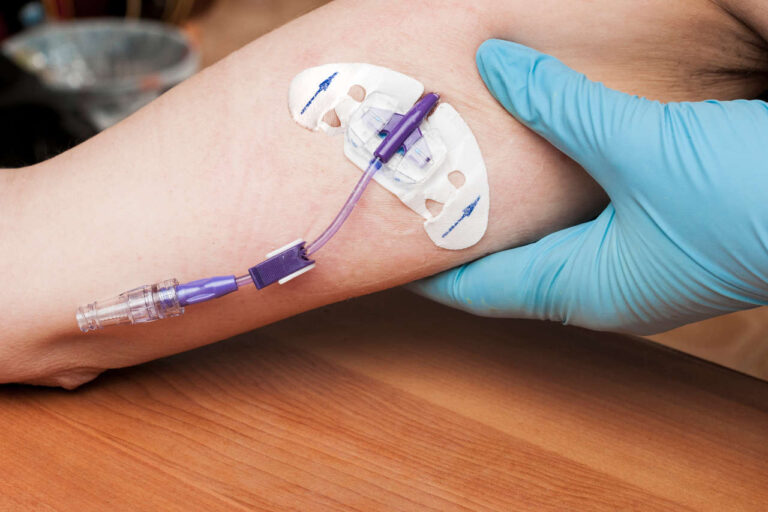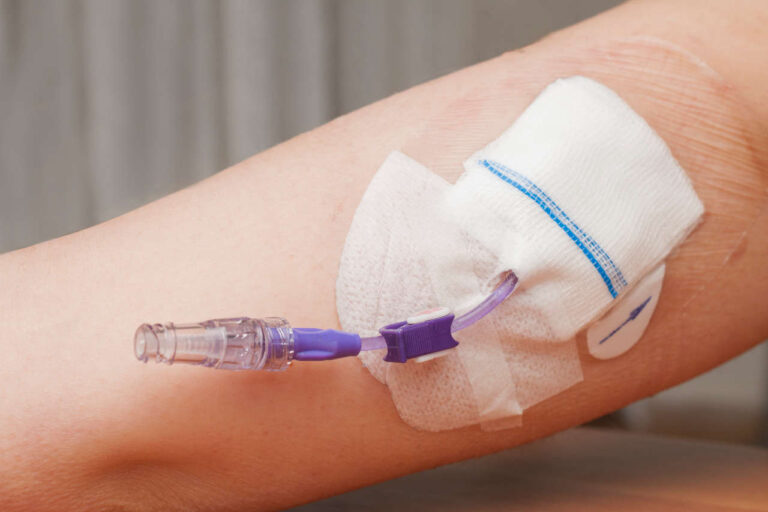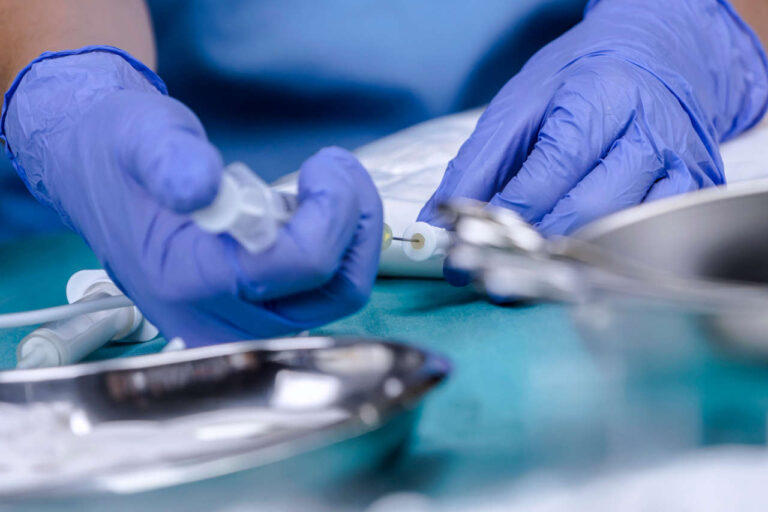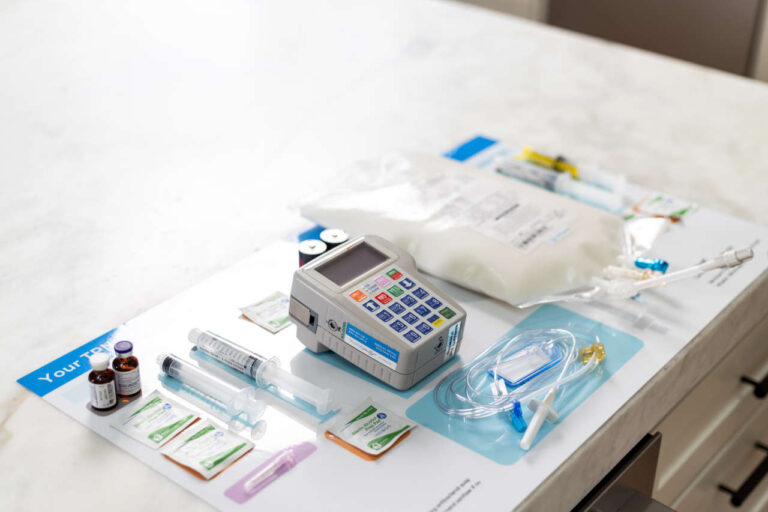
Proper care of neonatal health and nutrition supply is crucial as they are in their transition period. In addition, during this phase of growth and development, fluctuations in newborn health are normal. It is necessary to address neonatal health concerns immediately with proper monitoring of nutritional supply to avoid any irreversible damage to the baby’s well-being.
ستاسو د رګونو مایعات، تل شتون لري
بشپړ انوینټري، له ستونزو پرته لاسرسیPoor nutrition is responsible for causing 3.1 million deaths in children annually around the globe, with nearly half of all deaths occurring in children aged below 5 years. د والدینو بشپړ تغذیه, abbreviated as TPN, plays a significant role in ensuring the growth and nourishment of newborns who are malnourished, critically ill, or unable to intake their required nutrition orally.
Adequate nutritional supply and monitoring are important in neonates and children as malnourishment may lead to lifelong conditions or disorders. For example, in 2022, more than 1 in 5 children below 5 years worldwide had stunted growth because of malnourishment. In this blog, we will discuss everything about TPN for neonates, how TPN should be administered to neonates, and in what conditions TPN is commonly given to them.
What Is TPN?
TPN, also called total parenteral nutrition, is the complete supply of nutrition through a liquid. It is given intravenously (IV) to neonates, children, adults, or the elderly who are unable to take food orally due to any illness or having a nonfunctional digestive tract.
People who can’t use their digestive systems to absorb or digest food because of any disease are administered nutrition intravenously through an IV catheter. The administration of nutrients through the parenteral (IV) form bypasses the entire digestive system from the mouth to the anus and directly reaches the bloodstream.
Types of Parenteral Nutrition
There are two types of parenteral nutrition:
- Partial parenteral nutrition (PPN)
- Total parenteral nutrition (TPN)
Partial parenteral nutrition is given to patients who are taking some portion of their meals but are still malnourished. This might be possible because the amount of food they are consuming is not enough or is not providing adequate nutrition as per their body requirements. Hence, partial parenteral nutrition is given to supplement the deficient calories or nutrition in a person’s diet.
On the other hand, as the name indicates, total parenteral nutrition is the complete (total) supply of nutrition given to patients whose digestive systems are completely impaired or who cannot take food orally.
Why TPN for Neonates?

TPN may be given to neonates for a variety of reasons, which include:
Premature Births
One of the common reasons why TPN is given to neonates is premature birth. Neonates with preterm birth commonly have an underdeveloped gastrointestinal system which prevents their ability to absorb and digest food and nutrients. The administration of TPN provides a direct source of nourishment necessary for the growth and development of preterm infants.
Inadequate Oral Intake
TPN is administered to neonates if they are unable to consume milk orally which diminishes their nutrition supply. Inadequate oral intake of milk might occur due to some medical conditions, like weak suck-swallow coordination, respiratory distress, or others. TPN is commonly given until the medical condition is managed and the oral feeding abilities of neonates improve.
Gastrointestinal Disorders
Various gastrointestinal problems, like diarrhea, vomiting, indigestion, or stomach issues are common in neonates which hinder their ability to absorb and digest nutrients. If gastrointestinal disorders persist for the long term, TPN may be needed to ensure the proper supply of nutrients.
Insufficient Supply of Breast Milk
Breast milk is the major enriched source of nutrition responsible for fulfilling the dietary needs of neonates. However, when the mothers are unable to produce sufficient breast milk necessary for the nourishment of their newborns, TPN can be used as a supplemental source of nutrition.
In addition, administering pasteurized donor human milk or formula milk to neonates and making efforts to improve breast milk supply can also be done.
Ask About TPN Home Infusion
Post-Surgical Nutrition
Neonates who are born with any dysfunction, abnormality, or disorder may need to go through complex surgical procedures, like abdominal or cardiac surgeries.
Surgeries may restrict or temporarily impair their digestive or oral feeding ability. Hence the nutritional requirements of newborns may be supplemented through total parenteral nutrition.
Metabolic Disorders
Inherited metabolic disorders in neonates may diminish their ability to metabolize nutrients. Customized TPN can be given that is tailored to meet the unique dietary needs of infants and ensure optimal growth during certain metabolic treatments.
What Does TPN Contain?
TPN is a complete mixture of nutrition, including electrolytes, macronutrients, and micronutrients that is tailored to meet the specific dietary needs of neonates.
د components of TPN include:
- Vitamins and minerals: Vitamins and minerals are vital for various physiological processes in the body, like enzymatic reactions and bone formation.
- Electrolytes: الکترولیتونه maintain fluid balance, muscle function, and nerve conduction.
- Proteins: Amino acids and proteins are needed for tissue growth and repair.
- Glucose: Glucose is a source of carbohydrates that gives energy to the neonatal growing body.
- Lipids: Lipids provide the essential fat-soluble vitamins and fatty acids required for brain development.
- Trace elements: TPN also contains trace elements of selenium, zinc, copper, and others that are required for helping in enzymatic reactions and metabolic functions of the body.
Administration of TPN to Neonates
Before the administration of TPN to neonates, a thorough assessment of their health condition and nutritional requirements is necessary.
The decision to administer TPN to neonates is made after the collaboration of the entire healthcare team, including neonatologists, pharmacists, and pediatric nutritionists.
To ensure the safety and optimal delivery of nutrition to neonates, proper planning, preparation, and monitoring should be done. The steps of administering TPN to neonates include:
Assessment
As discussed, the first step before administering TPN to neonates is assessing their health condition and nutritional needs based on their body weight, gestational age, laboratory results, or other medical tests.
Formulation
د TPN solution is prepared by a specialized pharmacist according to the required and prescribed nutrient composition and concentration which is based on individual neonatal needs.
له متخصص سره خبرې وکړئ
د کاپي مرستې په اړهInsertion
After preparing the TPN as prescribed, a catheter is inserted into a large vein of the neonate to infuse the TPN. The catheter may be inserted into the neonate’s umbilical (belly), hand, foot, or scalp veins. Then the nutrition solution is inserted into the catheter, enabling the direct delivery of nutrients into the baby’s bloodstream.
Monitoring
To prevent complications and risks associated with parenteral nutrition in neonates, proper monitoring during and after the administration of TPN is crucial. For example, it is necessary to monitor neonatal vital signs, like electrolyte status, blood glucose, and liver function.













